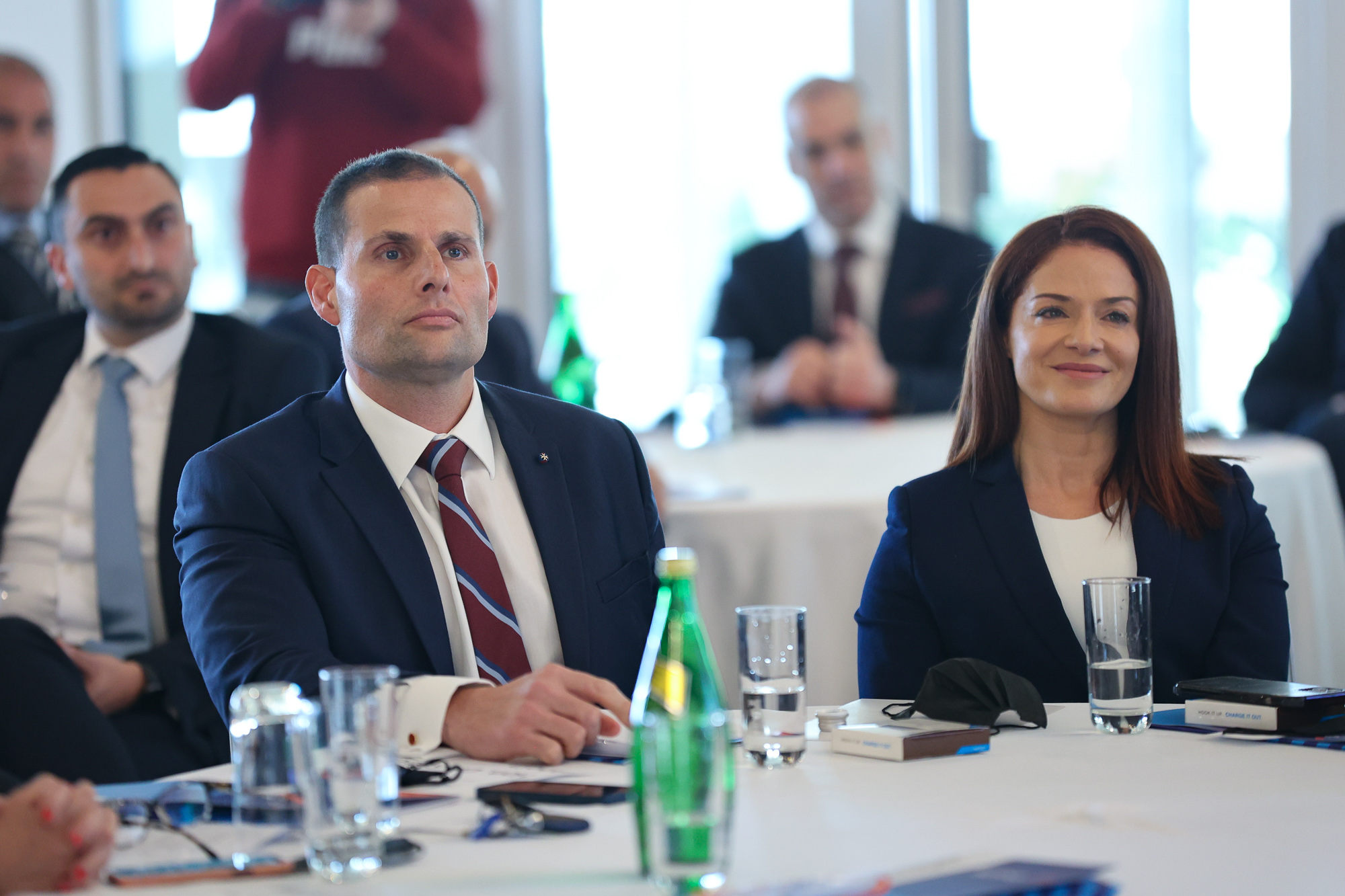
European Cyber resilience act – Share your views!


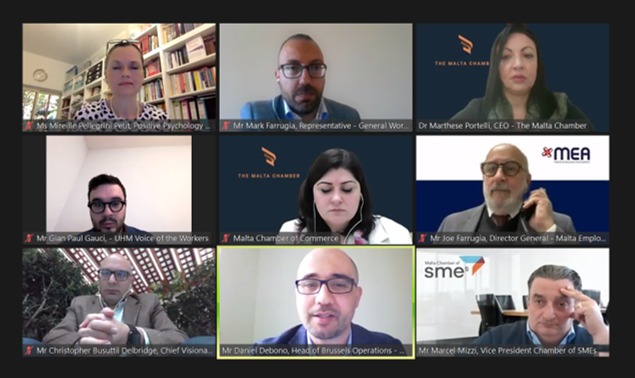
Tunisian Ambassador to Malta H.E. Yassine El Oued accompanies by his First Secretary Mr Mohamed Wael Khammassi visited the SME Chamber office in Floriana and met President Mr Paul Abela and Council Member Mr Mario DeBono.
Both sides discussed the success following the recent online business forum organised between the Malta Chamber of SMEs and the Tunisian Chamber with the collaboration of the Tunisian Embassy in Malta.

Mr Paul Abela mentioned that further collaborations will be organised between the Tunisian Embassy in Malta and the Malta Chamber of SMEs with the ultimate aim being that of creating business for both countries.

The Malta Chamber of SMEs earlier this week organised online information session on the new schemes for the purchase of Electric Vehicles announced last week by Transport Malta.
The information session was aimed for businesses intending to purchase new vehicles in the years to come. The new schemes caters for different requirements and subsidise cost for the purchase of EVs. This time round the grants available also cover investment costs for standard M1 vehicles up to the purchase of large passenger vehicles (coaches).
The amount in grant also ranges from Eur 13,000 per M1 vehicles (up to 10 vehicles) up to Eur 250,000 for large passenger vehicles.
Following feedback submitted by the SME Chamber, grants available for the purchase of large fleets, fall under the General Block Exemption Regulation, meaning that businesses who already exhausted their allocated amounts under the de-minimis regulation (Euro 200K). In this case grants cover the investment cost of the vehicle (the difference in price between an ICE vehicle and an Electric Vehicle) rather than a specified lump sump.
The session was delivered by 2 of Transport Malta top officials, Mr Gilbert Agius, Deputy Chief Officer at Transport Malta and Ing. Ronald Attard Pullicino, Manager, Transport Services at Transport Malta.
Members present were able to direct questions to Transport Malta. A detailed report, together with the session recording will also be sent to members for their perusal.
Members may watch the recorded webinar by requesting the link by email to
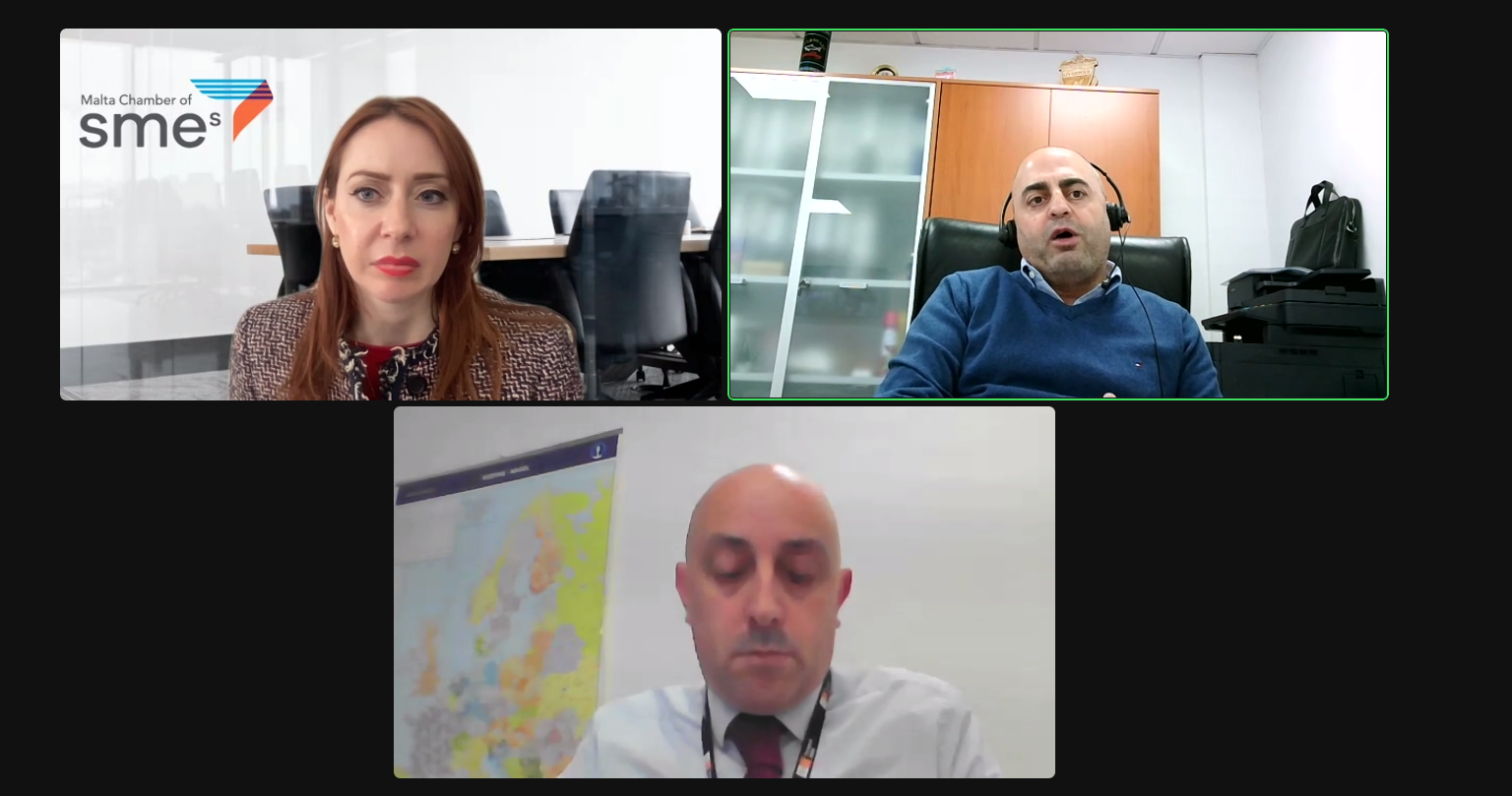

Have you ever wondered how you can transform your business and take the lead on sustainability? Then this is the opportunity you may just be looking for.
The Energy and Water Agency is offering a set of free online sustainability sessions aimed at the corporate sector. The course will cover a spectrum of sustainability opportunities including waste management, renewable energy, water and energy efficiency, sustainable buildings, green roofs, and much more.
The course has been designed to be interactive and registrants will have the opportunity to participate in various group tasks, discuss best practices and learn from one another. Through the various case studies led by multiple experts at the forefront of sustainability, attendees will gain first-hand knowledge on sustainable measures to implement to their business.
Participants will gain a holistic overview of sustainable measures they can incorporate to their business to level up their Corporate Social Responsibility. The course is endorsed by the Ministry for Energy, Enterprise and Sustainable Development. Upon completion, attendees will receive a certificate of participation which be showcased on your digital platforms to celebrate your commitment towards sustainability.
Upon request attendees can also receive a free consultation session, to discuss best practices and factual tips that they can implement within the company. All information disclosed will remain confidential.
The course is made up of three, 3-hour sessions which will be held every Tuesday between 12.30 pm – 3.30 pm, starting Tuesday 22nd February 2022. Download the accompanying flyer for more information.
To reserve your space today, contact Amanda Zahra on tel: +356 2229 2532 or by email at . Attendees will be accepted on a first come, first served basis.
Ms Kelsey Camilleri is currently undertaking a (BSc) Degree in Financial Services and Management at Mcast. As part of her dissertation, she is conducting a questionnaire to uncover the perspective and factors affecting the uptake of a cashless society among full-time self-employed individuals and local employees. Kindly spare 5 minutes to participate in this study.
The Social Entrepreneurs Association Malta (SEAM), in partnership with the Center for Social Innovation in Cyprus, is implementing the Project Social Entrepreneurial Skills for Success Program (SESSP). The project is financed by the Erasmus+ Programme of the European Union. The overall aim of the project is to offer high quality learning opportunities to enterprises that want to have a social impact.
In order to evaluate the needs of social enterprises across Malta and Cyprus in terms of training, support mechanisms and other areas, we are requesting social entrepreneurs in the two countries to fill in this short survey. Filling the survey will not take longer than 20 minutes and will help SEAM design an effective training program based on the respondents’ needs. The survey contains a section on general information on your enterprise, followed by 8 questions on your enterprise’s goals, challenges, training and support needs.
Should you have any queries, please email Lara Bezzina on
Click here to participate in this research
We thank you in advance for taking the time to fill in the surveys.
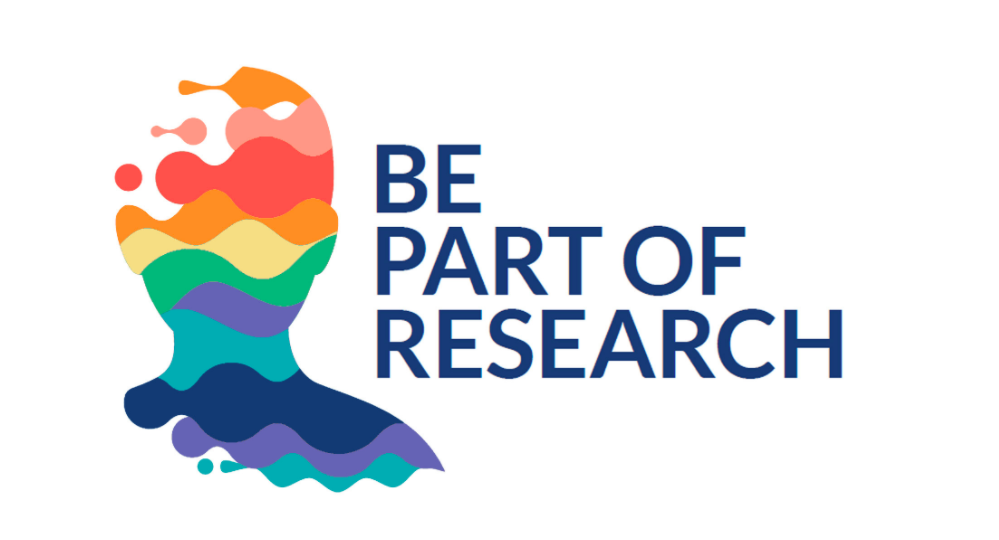

Malta Enterprise announced that the COVID-19 wage supplement has been extended to April.
In a facebook post, Malta Enterprise said that the current amounts of Wage Supplement continue to apply.
On Monday, when presenting its 35 election manifest proposals during the Leaders for smes event, the SME Chamber proposed that covid-19 safet net should be extended.
Throughout the past months, the Malta Chamber of SMEs had emphasised on the importance to extend the wage supplement especially for those sectors that didn’t completely recover.
The Malta Chamber of SMEs, the Malta Employers Association and the Chamber of Commerce called for the immediate withdrawal of the PL’s proposal for mandatory union membership.
Spokespersons of the associations addressed a press conference, saying that the mandatory union membership proposal goes against the country’s constitutional principles.
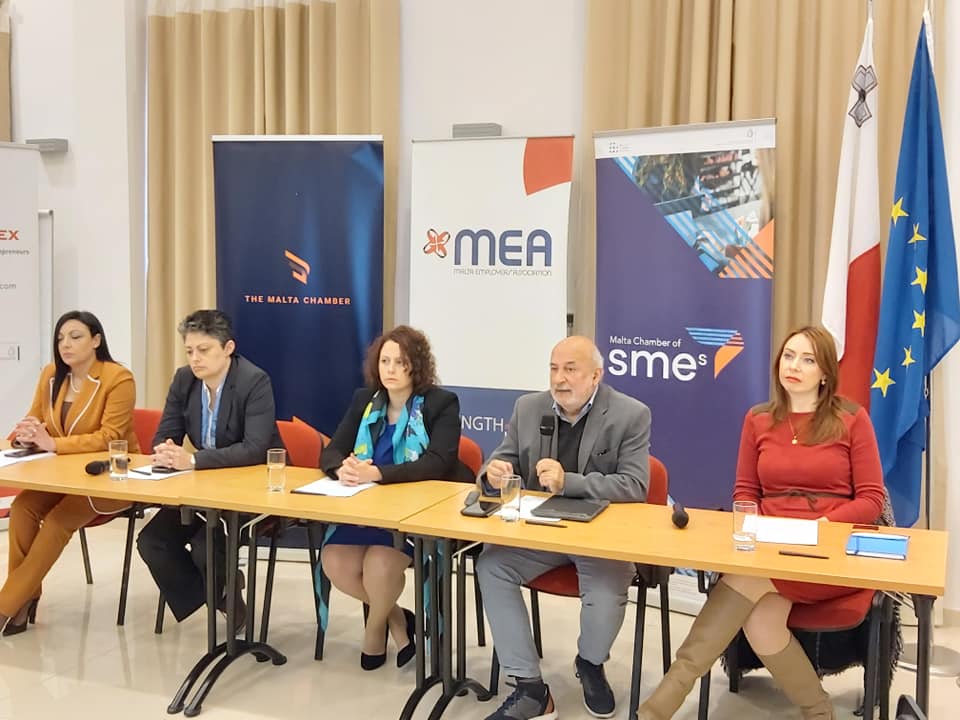
CEO at the Malta Chamber of SMEs Abigail Mamo said that the PL’s proposal has induced serious worries in small businesses, who are concerned that their positive relations with their employees will change upon implementation of the proposal. Mamo said that there has been no situations or circumstances where the employer’s bodies felt the need for a mandatory union membership proposal.
President of the MEA Joanne Bondin said that the employer bodies have always opposed this kind of proposal, due to the risk that it will force industrial relations within the country to change drastically, she said.
President of the Malta Chamber of Commerce Marisa Xuereb said that the proposal will deprive workers of their human rights. Mandatory membership also reduces the incentive that workers have to carry out their job correctly, Xuereb said.
Director General of the MEA Joe Farrugia said that the proposal goes against the constitution and fails to consider social dialogue between the government and employers and workers.
He encouraged political parties to focus on capacity building, saying that the proposal will result in serious disruption in social dialogue systems in Malta.
Click here to view press conference: https://www.facebook.com/smechamber.mt/videos/304307331641319
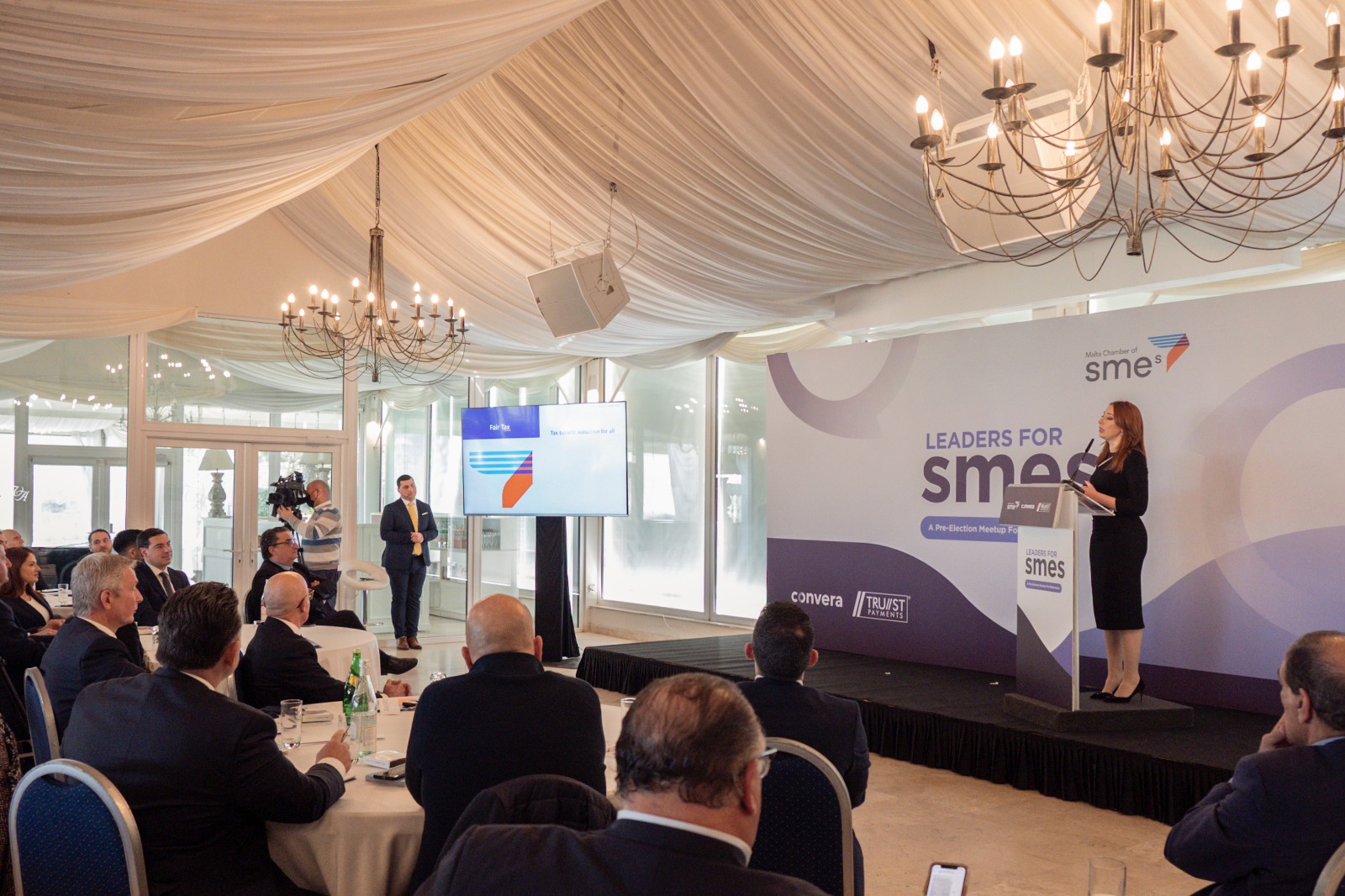
The Malta Chamber of SMEs CEO Ms Abigail Agius Mamo on Monday presented 35 election proposals for the consideration of the political parties.
Agius Mamo presented the election manifest during the Leaders for SMEs event, during which Prime Minister Robert Abela and Opposition Leader Bernard Grech addressed SMEs and replied to questions made by members of the SME Chamber.
Ms Agius Mamo remarked that both the Labour and Nationalist Parties are pledging a reduction in tax for businesses. She appealed that this measure does not discriminate between big companies and the self-employed.
Amongst the SME chamber proposals, the chamber is calling for the removal of excise tax especially on personal hygiene products.
The Chamber of SMEs is proposing that more accountability is needed when awarding direct orders and when dealing with public procurement to ensure a level playing field. It also suggested the setting up of a regulator to oversee public procurement and direct orders.
SMEs Chamber President Paul Abela referred to the height of the pandemic and said that following discussions with the government, the salary supplement was issued which he described as a measure that saved some 100,000 jobs and was the success of everything.
Paul Abela warned that problems would not stop once Malta is off the grey list, he added that once Malta comes of the grey list – a list of jurisdictions under increased monitoring by the Financial Action Task Force – the country would have to start from the beginning.
Abela also highlighted the problems businesses face while banking. There is increased bureaucracy, the president said, noting how businesses are being asked to fill in forms by a certain date, otherwise the bank would close their accounts.
Referring to the Russian invasion of Ukraine, he said that the country has to consider how it will meet the challenges of energy, gas and grain prices.
